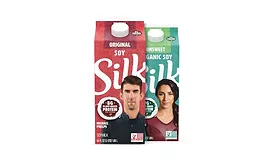Home » Keywords: » soy milk
Items Tagged with 'soy milk'
ARTICLES
Nutrition, sustainability trends impact plant milks
Read More
Silk teams up with Phaedra Parks to expose cereal liars
New York City pop-up asks consumers whether they prefer Silk Vanilla Almondmilk or dairy milk
January 9, 2025
Silk Soymilk teams up with Olympians Michael Phelps, Aly Raisman
Dairy alternative brand to donate to Feeding America
May 8, 2020
2019 State of the Beverage Industry: Dairy category benefits from flexible consumers
New forms of alternative milks emerge
July 15, 2019
2018 State of the Beverage Industry: Dairy alternatives drive success for category
Consumer demand for clean-label products impact dairy segment
July 11, 2018
Dairy alternatives continue to increase market share
New plant-based beverages emerging at retail
November 12, 2015
2015 State of the Beverage Industry: Almond milk continues to lead dairy alternatives
Coconut milk continues to show potential
July 13, 2015
Almond milk leads growth in the dairy alternatives segment
Coconut milk shows potential
November 12, 2014
WhiteWave Foods to acquire So Delicious Dairy Free for $195 million
New brands to expand WhiteWave’s plant-based food and beverages platform
September 18, 2014
2014 State of the Industry: Dairy and alternatives
Almond milk trailblazes the non-dairy segment
July 11, 2014
Elevate your expertise in the beverage marketplace with unparalleled insights and connections.
Join thousands of beverage professionals today. Shouldn’t you know what they know?
JOIN NOW!Copyright ©2026. All Rights Reserved BNP Media.
Design, CMS, Hosting & Web Development :: ePublishing







